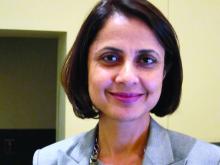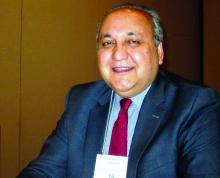BOSTON – As part of the push to create value-based care across the specialties, hepatologists should consider medical homes for their patients, such as those with cirrhosis, according to experts.
“Cirrhosis is a chronic condition, highly symptomatic, and occurs in highly comorbid individuals. Treating them in a medical home scenario means we can offer services that we don’t otherwise do, but which are associated with better outcomes for our patients,” Fasiha Kanwal, MD, of the department of medicine at Baylor College of Medicine, Houston, said in a panel presentation at the annual meeting of the American Association for the Study of Liver Diseases.
Creating such a primary care clinic for persons with chronic hepatic conditions doesn’t mean the hepatologist is the one to perform all the services, however. “Instead, your team is coordinated, and all the care for the patient is delivered in your clinic. It is a very viable model,” said Dr. Kanwal. “Some of us practice like that already, but this is formalizing it so we can do it in a more sustainable way.”Essentially, value-based care is the evolution of evidence-based medicine, according to Zobair M. Younossi, MD, AGAF, FAASLD, chair of the department of medicine at Inova Fairfax (Va.) Hospital. With value-based care, aligned incentives across all the specialties will lead to more precise accounting and efficiencies of care, said Dr. Younossi, who was also on the panel. “It would be very difficult right now to ask a hospital to tell you exactly what the cost of their liver care would be,” he said.
Although recent legislation is driving patient-based care, regardless of who is in political office, this is where the momentum is in medicine, agreed both Dr. Kanwal and Dr. Younossi. Also undergirding the new era is the need to serve an ever-growing population of patients who are living longer with chronic conditions. Because the focus has switched from rewarding the volume of services performed to the outcomes of those services – including patient-reported satisfaction with care – medical homes where patients are offered both primary and specialty care make the most sense, according to Dr. Younossi.However, at present there are no true value-based models for hepatology in the United States, according to Dr. Kanwal, so clinicians should start by defining what will “truly constitute value for our patients.”
Because psychosocial support is essential to improved outcomes in patients with cirrhosis, she suggested adding case managers in practice, as they can help coordinate with services in the community at large. Other suggestions she offered included extending office hours, operating an after-hours hotline, and building teams that include general internists, additional nursing staff, and nutritionists.
Even though such changes in clinical practice models now are inevitable, Dr. Kanwal said there are few data at present that support how to innovate care in hospitalized patients with cirrhosis. This matters, as how patients present for outpatient follow-up care will impact reimbursements to the clinicians who treat them.
Some possible ways to improve hospital outcomes for patients with cirrhosis include creating a “best practice alert” that prompts a hepatology consult and triggers the implementation of a standardized set of guidelines for addressing ascites, bleeding, acute kidney injury, encephalopathy, and hepatorenal syndrome. For those with decompensated cirrhosis or for those who need transplants, a similar standardized checklist can be systematized between the hospital and clinic, emphasizing inpatient rifaximin and prophylactic antibiotics in case of spontaneous bacterial peritonitis.
With an overt emphasis on the needs of patients and payers, clinicians now must compete with one another to offer the most comprehensive, cost-effective care supported by information technology structures that can assess real time costs and outcomes, said Dr. Younossi. “Hepatology is lagging behind other fields in all this,” he added.
This worries Dr. Kanwal: “We should be the ones to determine what the value should be. We should be the ones to decide what the model will be and to engage with other fields, and the payers. Otherwise we will not have a seat at the table.”
Dr. Kanwal and Dr. Younossi did not have any relevant financial disclosures.
On Twitter @whitneymcknight




